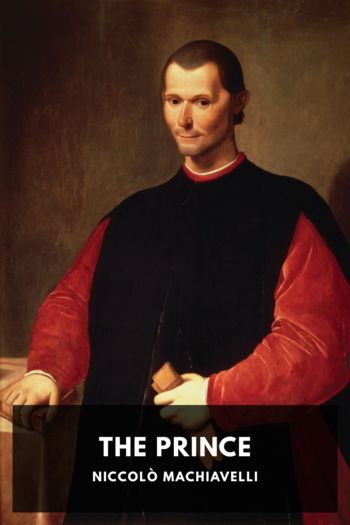The Prince, Niccolò Machiavelli [ebooks online reader .TXT] 📗

- Author: Niccolò Machiavelli
Book online «The Prince, Niccolò Machiavelli [ebooks online reader .TXT] 📗». Author Niccolò Machiavelli
When all the actions of the duke are recalled, I do not know how to blame him, but rather it appears to be, as I have said, that I ought to offer him for imitation to all those who, by the fortune or the arms of others, are raised to government. Because he, having a lofty spirit and far-reaching aims, could not have regulated his conduct otherwise, and only the shortness of the life of Alexander and his own sickness frustrated his designs. Therefore, he who considers it necessary to secure himself in his new principality, to win friends, to overcome either by force or fraud, to make himself beloved and feared by the people, to be followed and revered by the soldiers, to exterminate those who have power or reason to hurt him, to change the old order of things for new, to be severe and gracious, magnanimous and liberal, to destroy a disloyal soldiery and to create new, to maintain friendship with kings and princes in such a way that they must help him with zeal and offend with caution, cannot find a more lively example than the actions of this man.
Only can he be blamed for the election of Julius the Second, in whom he made a bad choice, because, as is said, not being able to elect a Pope to his own mind, he could have hindered any other from being elected Pope; and he ought never to have consented to the election of any cardinal whom he had injured or who had cause to fear him if they became pontiffs. For men injure either from fear or hatred. Those whom he had injured, amongst others, were San Pietro ad Vincula, Colonna, San Giorgio, and Ascanio.14 The rest, in becoming Pope, had to fear him, Rouen and the Spaniards excepted; the latter from their relationship and obligations, the former from his influence, the kingdom of France having relations with him. Therefore, above everything, the duke ought to have created a Spaniard Pope, and, failing him, he ought to have consented to Rouen and not San Pietro ad Vincula. He who believes that new benefits will cause great personages to forget old injuries is deceived. Therefore, the duke erred in his choice, and it was the cause of his ultimate ruin.
VIII Concerning Those Who Have Obtained a Principality by WickednessAlthough a prince may rise from a private station in two ways, neither of which can be entirely attributed to fortune or genius, yet it is manifest to me that I must not be silent on them, although one could be more copiously treated when I discuss republics. These methods are when, either by some wicked or nefarious ways, one ascends to the principality, or when by the favour of his fellow-citizens a private person becomes the prince of his country. And speaking of the first method, it will be illustrated by two examples—one ancient, the other modern—and without entering further into the subject, I consider these two examples will suffice those who may be compelled to follow them.
Agathocles, the Sicilian,15 became King of Syracuse not only from a private but from a low and abject position. This man, the son of a potter, through all the changes in his fortunes always led an infamous life. Nevertheless, he accompanied his infamies with so much ability of mind and body that, having devoted himself to the military profession, he rose through its ranks to be Praetor of Syracuse. Being established in that position, and having deliberately resolved to make himself prince and to seize by violence, without obligation to others, that which had been conceded to him by assent, he came to an understanding for this purpose with Amilcar, the Carthaginian, who, with his army, was fighting in Sicily. One morning he assembled the people and the senate of Syracuse, as if he had to discuss with them things relating to the Republic, and at a given signal the soldiers killed all the senators and the richest of the people; these dead, he seized and held the princedom of that city without any civil commotion. And although he was twice routed by the Carthaginians, and ultimately besieged, yet not only was he able to defend his city, but leaving part of his men for its defence, with the others he attacked Africa, and in a short time raised the siege of Syracuse. The Carthaginians, reduced to extreme necessity, were compelled to come to terms with Agathocles, and, leaving Sicily to him, had to be content with the possession of Africa.
Therefore, he who considers the actions and the genius of this man will see nothing, or little, which can be attributed to fortune, inasmuch as he attained preeminence, as is shown above, not by the favour of anyone, but step by step in the military profession, which steps were gained with a thousand troubles and perils, and were afterwards boldly held by him with many hazardous dangers. Yet it cannot be called talent to slay fellow-citizens, to deceive friends,





Comments (0)